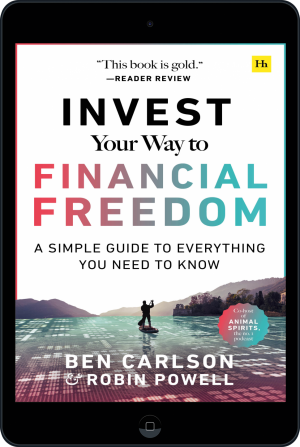Invest your Way to Financial Freedom: A simple guide to everything you need to know

Financial freedom is the ultimate goal for many investors. That’s not surprising, as giving up work and letting your passive income pay the bills is a very attractive prospect. But this has now become less likely for many people, given the current toxic combination of low savings rates and rising rates of inflation. With the Bank of England now expecting inflation to average 6% this year and the average interest rate on one-year cash ISAs barely 1%, real rates of return are now deep in negative territory.
Fortunately, for those willing to accept a certain degree of risk, the stock market provides many opportunities to grow wealth and the potential to acquire enough regular income to retire early. In their new book, Invest Your Way to Financial Freedom, authors Ben Carlson and Robin Powell show those new to investing how to make their financial dreams come true by saving and investing sensibly. This isn’t a ‘get-rich-quick’ strategy, though. The goal is to achieve financial freedom in the long term by applying simple rules, discipline, sacrifice and time.
Time is your biggest asset
One of the main themes throughout the book is that the earlier you start saving and investing the better. In other words, the earlier in life you start to focus on achieving financial goals, the less likely you are to worry about money in the years to come.
While ‘Baby Boomers’ and Generation X enjoyed cheap house prices and generous state benefits, young adults today face the challenge of uncertain, defined-contribution pensions, lower real wage growth and much higher asset prices. There is good news however, with big inheritances expected by some people, increasing rates of saving and, important for investors, technology enabling cheaper and easier access to global stock markets. The introduction ends with six fundamental principles, influenced by Warren Buffett, to keep in mind throughout the rest of the book.
Time to save
Chapter one explores the perhaps obvious idea of why you need to save money: if you don’t save you can’t invest. In the authors’ words: saving is your front-row ticket to financial freedom and is in fact more important than the ‘sexier’ action of investing. The next chapter focuses on one of the aforementioned six principles − developing good habits, so that no matter how small your savings are each month, you can see that you’re starting to build something bigger.
Next, the book focuses on the topic of when to start saving, with the clear advice to start as early as possible due to the “miracle” of compounding returns. It is a simple fact of maths that most investment returns come at the end of your investment period. So, starting earlier means that you gain much more in the long term and you won’t have to play catch up. One top tip is to look at saving money like a monthly bill or subscription, similar to paying for Netflix or a gym membership, ie making it a regular habit. Another is to avoid “lifestyle creep”, by ensuring your spending rate doesn’t outpace your savings even if you’re getting consistent pay rises at work.
Be productive
From chapter seven onwards we move to the investing section of the book. This is useful for those new to the stock markets, with the authors laying out the fundamental concept that you can’t earn high returns over the long run without accepting losses or volatility at times.
There is also the highly attractive proposition that, via the stock market, you can earn passive income without having to do any work, mainly via dividend payments. This is key to the ultimate financial- freedom goal, and the advice is to invest in productive assets. These are assets which generate a stream of income from their business activities: they are not assets like Bitcoin or physical gold where you have to rely on being able to sell them at a higher price to someone else in the future.
What exactly to invest in is then covered in the next few chapters, where the authors explain how trying to pick individual, winning shares is a tricky business. While some shares manage to return their initial investment many times over, there are also some big names which have gone down to zero over the years – remember Enron, Lehman Brothers and WorldCom? So, the advice is to diversify your portfolio, or to use a cricketing analogy, stop trying to hit a six off every ball and try to stay in the game.
The book also provides useful advice on areas like tax planning, calculating how much wealth you need to retire and even how to become a millionaire. Like any good investment book, it concludes with a list of “golden rules”, where Carlson and Powell serve up 20 which you should apply to personal finance. Some of the best include avoid credit cards like the plague, live below your means and material purchases won’t make you happier in the long run.
Free yourself
In the fictional, 24th century world of Star Trek, money no longer exists and everyone has the freedom to live their lives as they wish. In the absence of fiction becoming reality, Invest Your Way to Financial Freedom provides those of us in the 21st century with plenty of practical ideas on how to build the wealth needed to retire comfortably − and perhaps even early.
To sum up, Carlson and Powell have put together a highly readable guide on how you can grow your wealth by following simple rules and without having to undertake the task of picking out the best stock-market winners.
Comments (0)